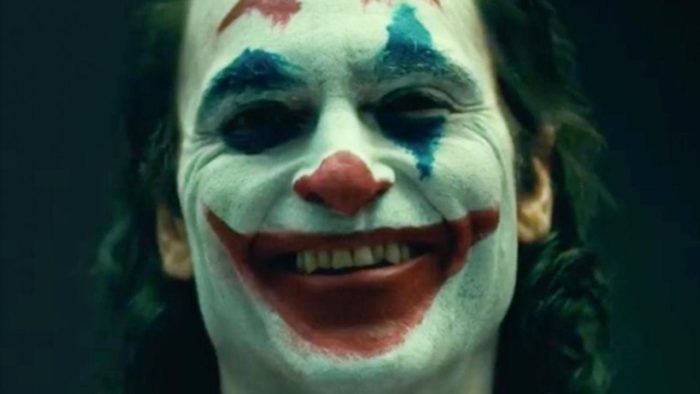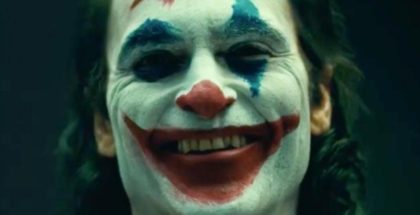VOD film review: Joker (2019)
Review Overview
Cast
9Surface
8Depth
7David Farnor | On 31, Aug 2019
Director: Todd Phillips
Cast: Joaquin Phoenix, Zazie Beetz, Robert De Niro
Certificate: 15
“People don’t consider what it’s like to be the other guy anymore.” That’s Arthur Fleck (Joaquin Phoenix) mid-rant in Joker, as he decries the state of the world today, a state that has left the rich dismissing the poor, the poor resenting the rich and those in need of therapy, medication or support with nowhere to turn for aid, due to state funding cuts. The year? Not 2019, but the 1970s, and Gotham City is on the brink of a descent into madness: a febrile, feverish madness that means murders on the street are considered commonplace and riots on public transport are the new norm.
Leading the descent is Arthur (Joaquin Phoenix), a has-been clown and would-be comedian, who has been told by his mother over and over to smile and put on a happy face – even though it’s quite clear there’s nothing to be happy about. We already know from the title of the film that he will eventually become the titular villain of DC comic books, but the intrigue in this standalone film lies in the way it shirks canon almost entirely to tell a new origin story.
The words “origin story” are enough to make many do a runner, but the influences upon Joker aren’t graphic novels or previous blockbuster franchises but Martin Scorsese’s dark duo of Taxi Driver and The King of Comedy. The latter, in particular, is recalled by the knowing casting of Robert De Niro as Murray Walker, a talk show host whose approval Arthur dreams of. The fact that we see some of these dreams is key to the unnerving nature of Joker, which plays with giving us a glimpse of his perspective on the world, while navigating towards his predetermined fate.
Todd “The Hangover” Phillips does the best directing job of his career with the twisted material, able to strike a tone that straddles stabs of bleak darkness, gasps of hope and pangs of inevitability. He sweeps the two-hour story along with a queasily compelling momentum, sinking down one level at a time until he’s plumbing horrific depths.
Because this is, let’s be clear, a horror story, not the celebratory tale of an antihero; Arthur’s warped worldview may set the mood, but Phillips still manages to juxtapose the way Arthur perceives situations and people with the stark reality the rest of the world – including his neighbour, Sophie (Zazie Beetz) – experiences. The script, co-written with Scott Silver, is brought to vivid life by Lawrence Sher’s cinematography, which is like watching The Hangover trilogy frozen in the dark hour just before the morning after, the city careening from sickly yellows and clinical blue-whites to inky shadows and spotlights of fame, the camera picking out splashes of red and the bright colours of the Joker’s familiar, garish outfit.
It is undeniably exciting to see a new interpretation of familiar lore, particularly one that tries to tackle topical issues. In Phillips’ Gotham City, unlike Tim Burton’s Gothic vision or Nolan’s vertiginous sea of skyscrapers, the main train tracks are a straight line direct from the slums to the wealthy finance hub; the collision of these two extremes, in this setting, appears unavoidable.
Everything from Taxi Driver to The Third Man can be seen in the noir-tinged urban chases and confrontations. All the while, the music by Hildur Guðnadóttir mixes the dread of Chernobyl with the drive of Sicario 2, accompanying events with a scratching orchestral cycle that relentlessly digs deeper as it goes. A recurring minor third jump almost echoes Batman’s theme in Christopher Nolan’s Dark Knight trilogy – but this perverse, sweeping opera is far from heroic.
All of this impressive, stylish construction wouldn’t work without Joaquin Phoenix, who inhabits his role with a commitment that’s magnetic in its unpredictability. He’s an immediately tragic figure, his eyes peeking out with resentment, anger and fear from under his white face paint. He humanises a character who might otherwise be two-dimensional, finding rejection, loneliness and a narcissistic sense of entitlement amid a bundle of neuroses and other, more serious mental health issues.
But, and here’s why Joker works, its understanding doesn’t cross the line into sympathy, as we’re left watching a man who becomes less and less human as his tragedy unfolds. We can see some of the threads that knit together to contribute towards this monstrous figure – his behaviour is, in some ways, the product of an unjust, divided society that doesn’t care – but they’re not the sole cause. The camera threatens to tilt and sway with Phoenix’s athletic presence, but we’re never asked to cheer Arthur on or root for him. We repeatedly see him burst into laughter, but can never rule out whether he’s actually crying; that and a crucial late-on editing choice mean that Joker stops short of fully adopting Arthur’s perspective. The film doesn’t play any of its violence for dark humour, but keeps its face straight; this story’s climax is one of terror, not triumph.
And yet, like Fight Club or V for Vendetta before it, the movie’s sharp topicality makes it hard not to wonder whether people could ironically see an outsider to revere as well as attempt to understand. Others may see, again not unlike Fight Club, a film that’s more surface than substance, only gesturing towards complicated questions and issues. Either way, the surprising nature of this revisionist psychological thriller – which belongs more in the Joaquin Phoenix Universe than the DC Universe – makes Joker the comic book villain we deserve right now.
This review was originally published during the 2019 Venice Film Festival.


















